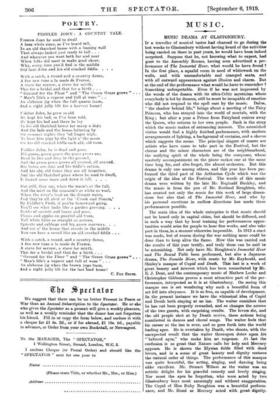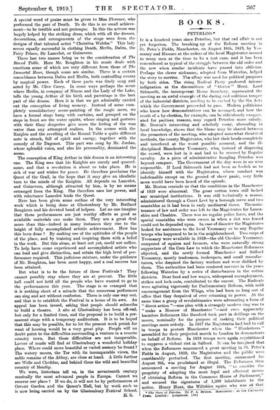MUSIC.
MUSIC DRA3LA AT GLASTONBURY.
IF a traveller of musical tastes had chanced to go during the last weeks to Glastonbury without having heard of the activities being carried on there in past years, he would have been indeed surprised. Suppose that be, not knowing what to expect, had gone to the Assembly Rooms, having seen advertised a per- form,ance of Th,e Immortal Hour, what would he have, found ? In the first place, a squalid room in need of whitewash on the walls, and with uncomfortable and cramped seats, and with all outward appearances against illusion and charm. But at the end of the performance what would he have to remember ? Something unforgettable. Even if be was not impressed by the words of the drama with its ultra-Celtic mysticism where everybody is led by dreams, still-he must be incapable of emotion who did not respond to the spell cast by the music. Debra, " the shadow behind life," brings about a meeting of the Fairy Princess, who has strayed into the world of mortals, with the King ; but after a year a Prince from Fairyland entices away the Queen, who returns to her own people. Such is the story which the music makes of entrancing interest. The astonished visitor would find a highly finished performance, with modern arrangements of lighting, a background of curtains, and a chorus which suggests the scene. The principal singers of course are artists who have come to take part in the Festival, but the chorus and the minor characters are of the neighbourhood, the unifying spirit of the whole being the composer, whose masterly accompaniment on the piano makes one at the same time long for, and also forget, the absent orchestra. But this drama is only one among others, and this year has been per- formed the third part of the Arthurian Cycle which was the origin of the idea of the Festival. The words of this music drama were written by the late Mr. Reginald Buckley, and the music is from the pen of Mr. Rutland Boughton, who has created not only the music for this work of large dimen- sions but also that of The Immortal Hour, and who by his personal exertions in endless directions has made these performances possible.
The main idea of the whole enterprise is that music should not be heard only in capital cities, but should be diffused, and in such a way that by local training for performances oppor- tunities would arise for people to hear fine works, and also take part in them, in a manner otherwise impossible. In 1913 a start was made, but .of cogran during the war nothing more could be done than to keep alive the flame. How this was carried out the results of this year testify, an,d truly these can be said to be astonishing. Not only have Mr. Boughton's Immortal Hour and The Round Table been performed, but also a Japanese drama, The Sumida River, with music by Mr. Raybould, and Shirley's masque of Cupid and Death. This last is a work of great beauty and interest Which has been resuscitated by Mr.
J. Dent, and 'the contemporary music of Mathew Locke and Christopher Gibbons proves a most attractive part of the per- fqrmance, interpreted as it is at Glastonbury. On seeing this masque one is set wondering why such a beautiful form of at fell into abeyance. It is so free, so capable of development. In the present instance we have the -whimsical idea, of Cupid and Death both staying at an inn. The waiter considers that he has not been properly rewarded, and so changes the arrows of the two ,guests, with surprising results. The lovers die, and the old people shot at by Death revive, these actions being manifested in dances and choral songs. The waiter •feels that his career at the inn is over, and so goes forth into the world leading apes. He is overtaken by Death, who sheets, with the unexpected result that the waiter thereupon dotes upon his beloved apes," who make him no response. At last the confusion is so great that Nature calls for help and Mercury Appears- He is shown the Elysian fields filled with dead lovers, and in a scene of great beauty and dignity restores the natural order of things. The performance of this masque was quite beautiful, the acting, singing, and dancing being alike excellent. Mr. Steuart Wilson as the waiter was an artistic delight for his graceful comedy and lovely singing. Nor must the apes be forgotten, who were acted by two Glastonbury boys most amusingly and without exaggeration. The Cupid of Miss Ruby Boughton was a beautiful perform- ance, and Mr. Hand as Mercury acted with great dignity. A special word of praise must be given to Miss Florence, who performed the part of Death. To do this is no small achieve- ment—to be terrible and not grotesque. In this the actress was largely helped by the striking dress, which with all the dresses, decorations, and arrangements of the stage were from the designs of that talented artist " Christina Walshe." This lady seems equally successful in clothing Death, Merlin, Darla, the Fairy Prince, Sir Lancelot, or Guinevere.
These last two names bring us to the consideration of The Round Table. Here Mr. Boughton in his music deals with emotions some of which are very different from those of The Immortal Hour, though some are similar. There is a certain resemblance between Dalua and Merlin, both controlling events by magical power. Each of these parts was finely sang and acted by Mr. Clive Carey. In some ways perhaps the scene where Merlin, in company of Nimue and the Lady of the Lake, tells the young Arthur of his birth and parentage is the best part of the drama. Here it is that we get admirably carried out the conception of living scenery. Instead of some com- pletely unsatisfactory scene-painting of the magic mere, we have a formal stage hung with curtains, and grouped on the steps in front are the water spirits, Whose singing and gestures with their filmy draperies give more the feeling of the wan water than any attempted realism. In the scenes with the Knights and the revelling of the Round Table a quite different note is struck, hill of spirit and energy, together with the comedy of Sir Tottgonet. This part was sung by Mr. Jordan, whose splendid voice, and also his personality, dominated the scene.
The conception of King Arthur in this drama is an interesting one. The King sees that his Knights are unruly and quarrel- some, and that a revolution is about to take place. He is• sick of war and wishes for peace. He therefore proclaims the Quest of the Grail, in the hope that it may give an idealistic turn to the minds of the Knights. All depends on Lancelot, and Guinevere, although attracted by him, is by no means estranged from the King. She therefore uses her power, and with reluctance Lancelot leads the Quest.
Here has been given some outline of the very interesting work which is being done at Glastonbury by Mr. Rutland Boughton and his deviated band of helpers. Let no one imagine that these performances are just worthy efforts as good as available materials can make them. They are a great deal more than this—indeed in many instances they rise to the height of fully accomplished artistic achievement. How has this been done ? By making use of the aptitudes of the people of the place, and by training and inspiring them with a belief in the work. But this alone, at least not yet, could not suffice. To help have come experienced and accomplished artists who can lead and give distinction, and attain the high level of per- formance required. This judicious mixture, under the guidance of Mr. Boughton, has been most happy, and a real success has been attained.
But what is to be the future of these Festivals ? They cannot possibly stay where they are at present. The little hall could not hold all the people who have wanted to go to the performances this year. The stage is so cramped that it is nothing short of a miracle that the numerous performers can sing and act without confusion. There is only one way out, and that is to establish the Festival in a home of its own. An appeal has been issued, asking that people should subscribe to build a theatre. A site at Glastonbury has been offered, but only for a limited time, and the proposal is to build a per- manent stage with a temporary auditorium. It is to be hoped that this may be possible, for to let the present work perish for want of housing would be a very great pity. People will no doubt point to the difficulties surrounding a venture in a remote country town. But these difficulties are not insuperable. Lovers of music will find at Glastonbury a wonderful holiday place. Where could more beautiful or varied scenery be found ? The watery moors, the Tor with its ineenaparable views, the noble remains of the Abbey, are close at hand. A little further are Wells and Cheddar, and behind these the wild and beautiful country of Mendip.
We were, historians tell us, in the seventeenth century
musically the most advanced people in Ettrope. Cannot we recover our place ? If we do, it will not be by performances at Covent Garden and the Queen's Hall, but by work such as is now being carried on by the Glastonbury Festival School.
H. S.



































 Previous page
Previous page